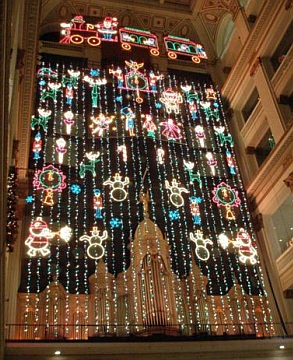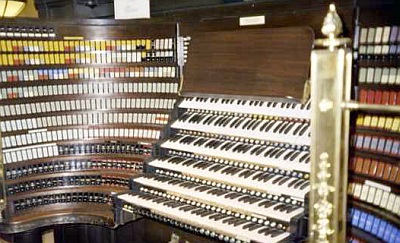"Shall the Wanamakers win?"
Originally composed for chapel at Canterbury Episcopal School, DeSoto TX
Epistle: 2 Peter 3.1-10; Gospel: Matthew 25.1-13 (1 Advent, Daily Office Year 1)
(The title is an allusion to a sermon composed by Harry Emerson Fosdick)
Note: this page uses the SP Ionic font. If you do not have this font installed, you will see odd characters instead of Greek letters at points in the text.
 If you have been outside, anywhere at all lately,
If you have been outside, anywhere at all lately,
you may have noticed that there's a holiday on the way –
and that it's been on the way
for somewhere between a week and a couple of months already.
The air is filled with the sounds of the season –
the cries of those who would have us believe
that unless we rush out right now
and buy expensive things for gift-giving,
we don't care about the people around us.
And it must be a religious holiday,
because at an enormous church near my home,
one resembling a sports stadium,
there's a huge display of lights spelling out “Rejoice.”
(Or maybe they're just happy that the Cowboys are finally doing well,
but if religion is what's most important in your life,
that's a matter of religion for some people, too).
But then, every once in a while, the still, small voice of a hand-bell
or the greeting “peace on earth”
sneaks through the assault on all of my senses.
And when it does,
it reminds me that things haven't always been this way.
The first Christians remembered the resurrection, not Bethlehem,
and when later they did remember the birth of Jesus,
they did it in August until the Emperor Constantine,
newly converted to the then new-fangled Christian faith,
took over the ancient Roman holiday of Saturnalia,
a festival that celebrated the return of the sun as the days began to grow longer.
 The Puritans who settled in Massachusetts
The Puritans who settled in Massachusetts
forbade the celebration of Christmas.
Nineteenth-century magazines and novels
by writers such as Charles Dickens
and William Dean Howells
tell us that there might be a special family meal
follwed by putting the tree up on Christmas eve,
with worship the next day at a church or home.
Not until later in that century,
when the Methodist John Wanamaker
turned his store into a cathedral of consumption,
complete with the largest pipe organ in the world,
did the assault on the senses get so completely underway.
In the ever-present human search for a God worthy of us,
we have found one
a marvelous god,
who loves to spend wildly just as much as we do –
for, as we are reminded by yet another commercial,
from a company started by another Methodist, Mr. Joyce Hall,
a man who thought God could use "a little help" in providing for him,
"God is like Hallmark,
he loves to send the very best".
Perhaps that's why the readings for the first weeks of Advent are so somber.
It's not a time to “Rejoice” as much as it's a time to prepare for the
coming of Christ.
In all religions,
the appearance of that ineffable divine
that is beyond just “being” and “power”
that we weakly name “God”
is Dangerous.
It is a time to beware, a time for which we must be prepared.
 Read the epistle lesson today: 2 Peter 3.1-10
Read the epistle lesson today: 2 Peter 3.1-10
There's a joke about a man who, having heard this passage,
went to God and asked if the same formula applied to money.
The reply was that it was, and even more so, for God holds all the riches
of the universe,
so that millions of dollars are no more than a penny to God.
The man thought about this and he asked if he might have a nickel.
The reply: “sure, come back tomorrow.”
The warnings are a reminder
that God is not contained by what we know or can say
and neither is God controlled by what we want
and God is not the cosmic Santa Claus waiting for prayers to give us the latest thing
that we think we need
and that while the earth is the Lord's and full of God,
they are a reminder that God does not live in Wanamaker's or anywhere else on earth.
In the ancient Greek in which the New Testament was written,
there are two kinds of time:
kai/roj, meaning "due measure, fitness, in season, at the right time,"
it's also the word Pythagoras uses for seven, the number of completion;
and xro/noj, which is measured by a clock.
Human time, the xro/noj, is limited --
it has a past, a present, and a future,
and most of all, a beginning and an end,
just as do each of us.
Divine Time, the kai/roj,
has the same boundaries as God and love --
that is, none!
When Jesus appeared, we are told that the time was fulfilled (Mark 1.15).
But from the confusion of expectations
with the events that came with this fulfillment,
we are reminded that God's time and human time are not the same.
Only if we are prepared, will we glimpse the view that God knows as kairoj,
instead of our limited xronoj.
And that is what Advent, this season of waiting and preparing, is all about.
When God answers prayer, will we be listening?
When God arrives, will we be ready?
Photo of Wanamaker organ from Wikipedia Media, reproduced under GNU Free Documentation License.
Photo of Christmas light show at Wanamaker's from Wikipedia Media, reproduced under Creative Commons ShareAlike License.
Clock reproduced under terms of use from Clip Art Heaven.